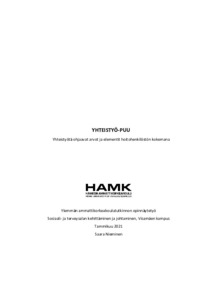Yhteistyö-puu. Yhteistyötä ohjaavat arvot ja elementit hoitohenkilöstön kokemana.
Nieminen, Saara (2021)
Nieminen, Saara
2021
All rights reserved. This publication is copyrighted. You may download, display and print it for Your own personal use. Commercial use is prohibited.
Julkaisun pysyvä osoite on
https://urn.fi/URN:NBN:fi:amk-202102011775
https://urn.fi/URN:NBN:fi:amk-202102011775
Tiivistelmä
Tämän opinnäytetyön tarkoituksena oli selvittää toimintatutkimuksen avulla, minkälaiset arvot ja elementit ohjaajat työyhteisön jäsenten välistä yhteistyötä. Tavoitteena oli myös selvittää työyhteisön yhteistyön nykytilaa sekä minkälaisilla käytännön toimilla yhteistyön toteutumista voidaan edistää. Tavoitteena oli lisäksi vahvistaa kokemusta omaan työhön vaikuttamisen mahdollisuudesta.
Opinnäytetyö toteutettiin yhdessä erään Hämeenlinnan kaupungin työyhteisön kanssa. Tarve opinnäytetyön tekemiselle nousi tulevaisuuden osaamistarpeista sekä työyhteisön toiveesta. Opinnäytetyön aineisto muodostui Webropol-kyselyn tuloksista ja toiminnallisissa työpajoissa tuotetusta materiaalista. Aineisto analysoitiin sisällön analyysilla.
Tärkeimmät yhteistyötä ohjaavat arvot ja elementit ovat vuorovaikutus, vastuullisuus, yhteistoiminta, yksilöllisyys, samanarvoisuus ja me-henki. Arvojen ja elementtien toteutumista edistää hyvä palautekulttuuri, vastavuoroinen vuorovaikutus sekä oman ja muiden töiden arvostaminen. Heikentäviksi tekijöiksi koettiin arvostuksen puute, heikko työhyvinvointi ja työstä palautumisen haasteet. Toiminnalliset työpajat miellettiin hyväksi kehittämisen ja osallistumisen muodoksi. Tuloksien pohjalta syntyi lopputuotos, Yhteistyö -puu, sanoitettu visio ja malli työyhteisön jäsenten väliseen yhteistyöhön. The purpose of this thesis was to find out through action research the values and elements that guide cooperation between the members of the work community. The aim was also to find out the current state of cooperation in the work community and what practical measures can be taken to promote cooperation. The aim was also to strengthen the experience of the possibility of influencing one’s own work.
This thesis was carried out together with a work community in the city of Hämeenlinna. The need to do this research arose from future competence requirements and the wishes of the work community. The material of the research consisted of the results of the Webropol-survey and the material produced in the functional workshops. The material was analyzed by content analysis.
The main values and elements guiding cooperation are interaction, responsibility, united action, individuality, equivalence and we-spirit. Good feedback culture, reciprocal interaction and valuing one’s own and others’ work promotes the realization of values and elements. Weakening factors were perceived as a lack of appreciation, poor well-being at work and the challenges of recovering from work. The functional workshops were perceived as a good form of development and participation. Based on the results, the final output, the cooperation-tree, a said vision and a model for cooperation between members of the work community were created.
Opinnäytetyö toteutettiin yhdessä erään Hämeenlinnan kaupungin työyhteisön kanssa. Tarve opinnäytetyön tekemiselle nousi tulevaisuuden osaamistarpeista sekä työyhteisön toiveesta. Opinnäytetyön aineisto muodostui Webropol-kyselyn tuloksista ja toiminnallisissa työpajoissa tuotetusta materiaalista. Aineisto analysoitiin sisällön analyysilla.
Tärkeimmät yhteistyötä ohjaavat arvot ja elementit ovat vuorovaikutus, vastuullisuus, yhteistoiminta, yksilöllisyys, samanarvoisuus ja me-henki. Arvojen ja elementtien toteutumista edistää hyvä palautekulttuuri, vastavuoroinen vuorovaikutus sekä oman ja muiden töiden arvostaminen. Heikentäviksi tekijöiksi koettiin arvostuksen puute, heikko työhyvinvointi ja työstä palautumisen haasteet. Toiminnalliset työpajat miellettiin hyväksi kehittämisen ja osallistumisen muodoksi. Tuloksien pohjalta syntyi lopputuotos, Yhteistyö -puu, sanoitettu visio ja malli työyhteisön jäsenten väliseen yhteistyöhön.
This thesis was carried out together with a work community in the city of Hämeenlinna. The need to do this research arose from future competence requirements and the wishes of the work community. The material of the research consisted of the results of the Webropol-survey and the material produced in the functional workshops. The material was analyzed by content analysis.
The main values and elements guiding cooperation are interaction, responsibility, united action, individuality, equivalence and we-spirit. Good feedback culture, reciprocal interaction and valuing one’s own and others’ work promotes the realization of values and elements. Weakening factors were perceived as a lack of appreciation, poor well-being at work and the challenges of recovering from work. The functional workshops were perceived as a good form of development and participation. Based on the results, the final output, the cooperation-tree, a said vision and a model for cooperation between members of the work community were created.
